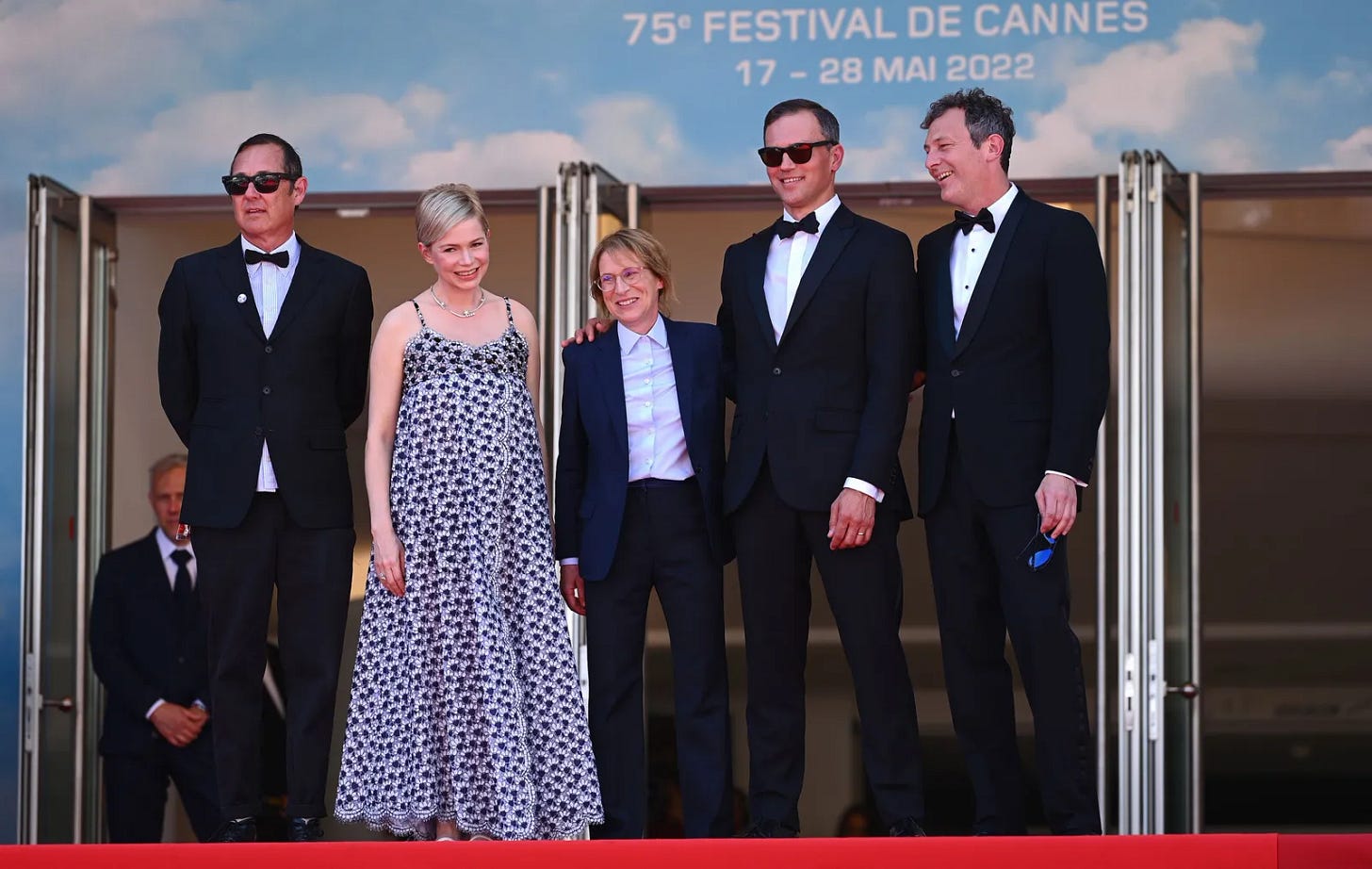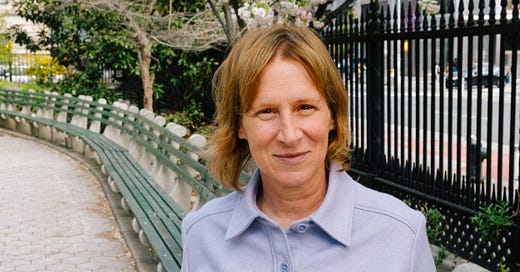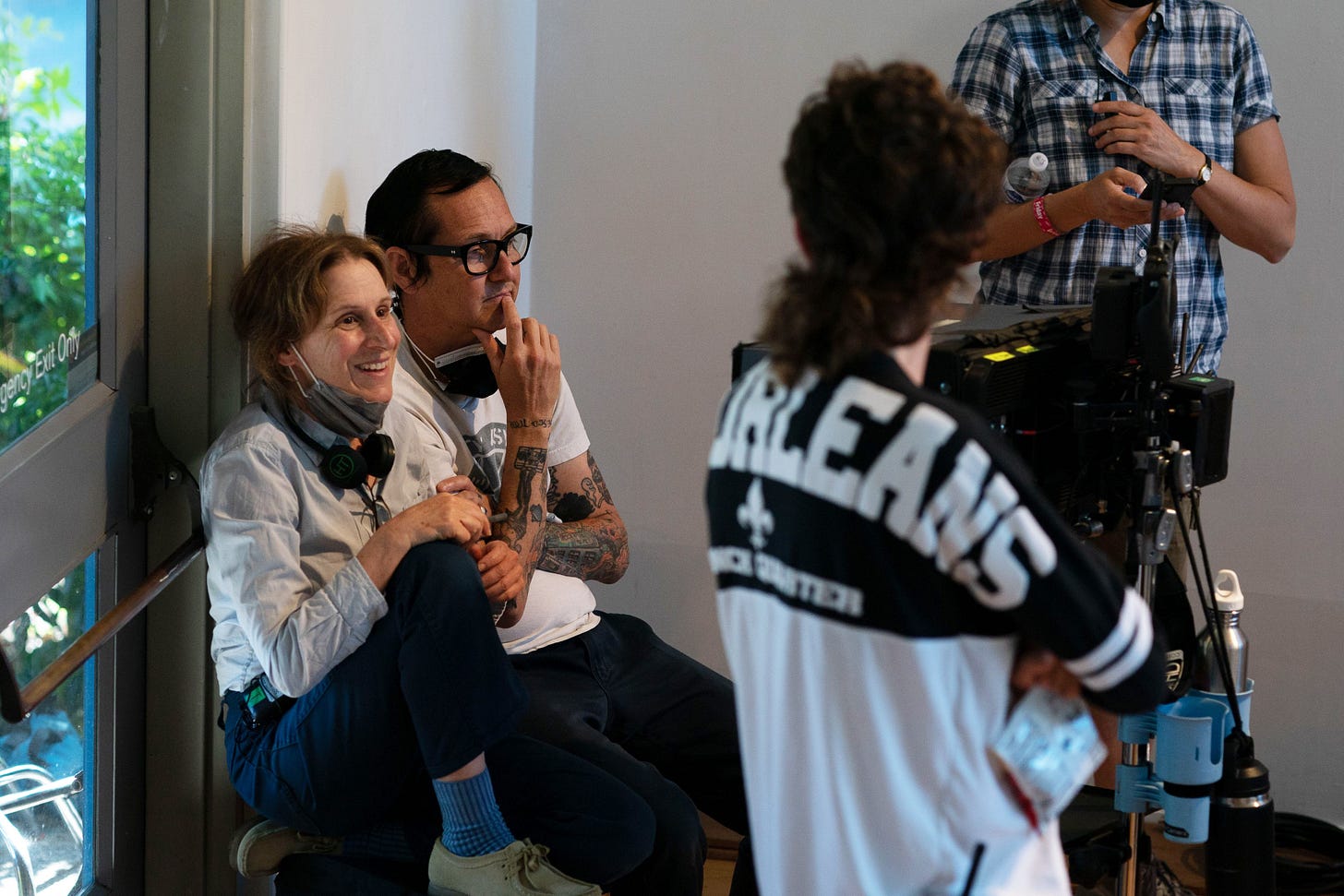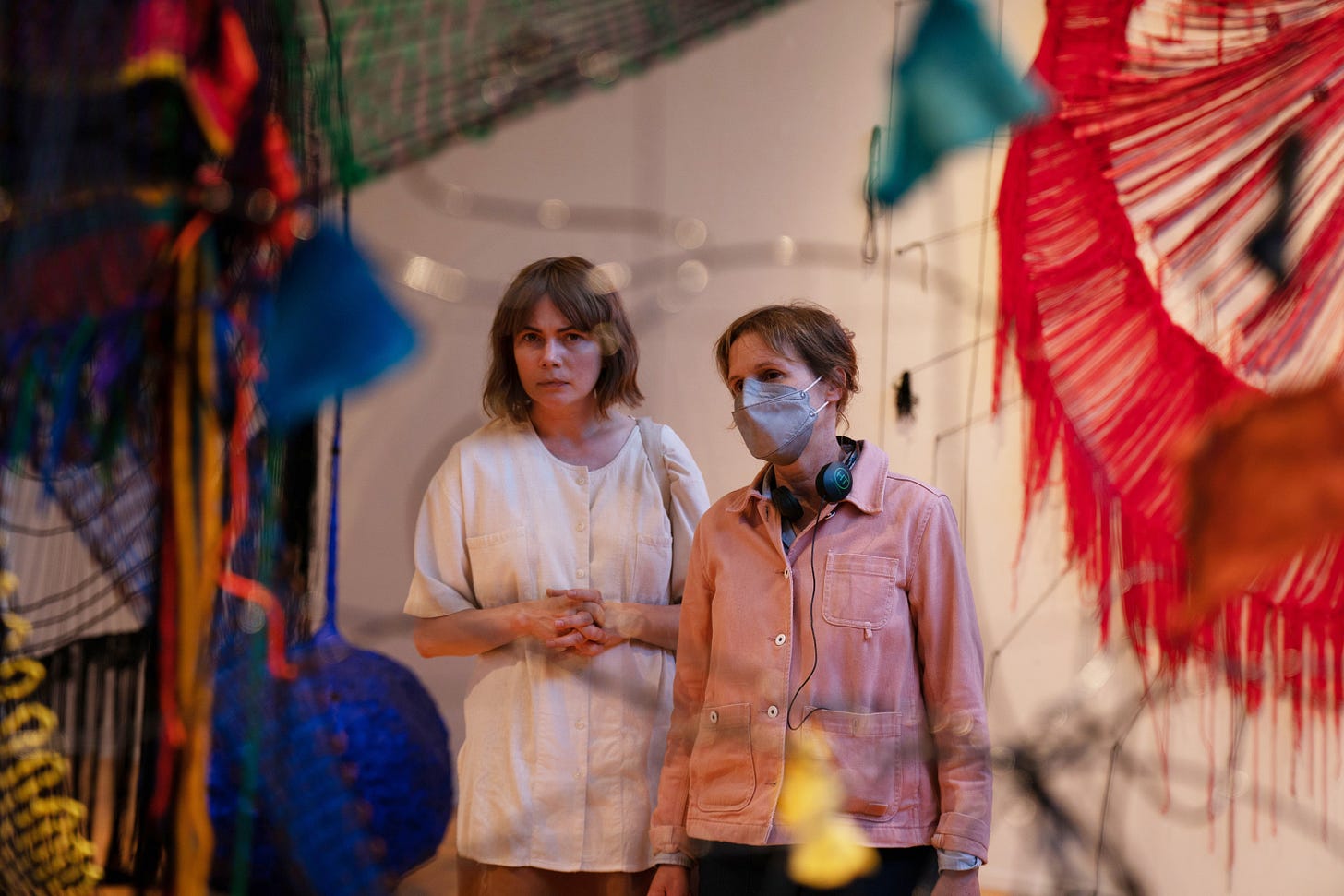Filmmaker Kelly Reichardt on her creative process and long-term collaborations
"You really have to put blinders on to not let the world interfere, and to carve out space for yourself."
Kelly Reichardt is one of the most important filmmakers working today. Since her 1994 debut River of Grass, Kelly has produced a singular body of work, including the films Old Joy (2006), Wendy and Lucy (2008), Meek’s Cutoff (2010), Night Moves (2013), Certain Women (2016), First Cow (2019), and her latest, Showing Up. In between projects she continues to teach film at Bard College. Her career has also been notable for her decades-long collaborations with actors, cinematographers, and other creative partners. It’s important during the ongoing SAG-AFTRA and writers’ strikes to recognize how many different people are involved in the process of making any film, and the importance of their creative contributions on both sides of the camera.
I spoke with Kelly earlier this month when she was at her home in Portland, Oregon, working on ideas for a new film project.
Gary: So are you working on a new film?
Kelly: Yeah, I'm just fucking around, doing some writing.
Gary: What's your writing process like?
Kelly: It's different on this one because usually I’m writing with Jon Raymond, which I still do, but he's working on a book right now. So I've been working on this — whatever it is, who knows if it'll turn into anything — for the past year on my own. When I start work in the morning, my process usually involves not looking at anything in the world, not looking at my phone or going online, nothing. You really have to put blinders on to not let the world interfere, and to carve out space for yourself. Because as soon as I tune into other things, I find it’s almost impossible to get back into a zone. So I write in the morning, and then there's some dogs up the street that I walk and I'll take them to the park or something. Then later in the afternoon I’ll do stuff like rewriting, the kind of thing that doesn't take as much brain power. And if that doesn't work, I take a nap. So that's my process.
Gary: Do you listen to music while you’re writing?
Kelly: Yeah, I usually put a record on in the morning, like jazz or something instrumental. But they’re records I'm familiar with, I'm not really listening to new stuff. I don't want the music choice to be a big decision, so there's like five records I tend to put on, maybe some Lee Morgan or something. Since it's instrumental, you're free to think of words and think of stories. And I think it helps if you’re familiar with the music, so you're not actively listening. If I have new records, I’ll only listen to them on the weekends when I'm not working.
Gary: So when you're working on new projects, is it a situation where you’ve got multiple films that are in different phases?
Kelly: No, I'm only ever working on one film at a time. All my friends work on multiple things, I'm such a one trick pony. I'm always all-in. It could end up — and it's happened before — where I work on something for a really long time and it doesn't pan out in the end. But there's no knowing while you're in it, I guess. If I'm writing with Jon, and I’m doubting myself, I always think, "Oh, he wouldn't be wasting his time on this if it sucked."
What usually happens is, I see a lot of it, like I'm thinking about how to shoot things while I'm writing. But when I'm working with Jon, he’s not necessarily thinking in those terms, he's thinking more internally. That brings another level to what's in the story and to the characters.

Process is such a weird thing to talk about, it's so un-magical. People want it to be magical, but for me it's really just about staying with it and working on the parts I know. If I get stuck, I'll go back and try to refine parts that I feel are working already. Like today I’m going back to all these note cards. Even though I'm really far into this process, I'm always going back to the note card stage of things.
“Process is such a weird thing to talk about, it’s so un-magical. People want it to be magical, but for me it’s really just about staying with it and working on the parts I know.”
Gary: And those note cards are actual scenes, or are they just scraps of ideas?
Kelly: They’re scenes, yeah. It’s so I can get a bird's eye view of what the story is looking like.
Gary: Do you use any organizational apps or digital tools to help structure this stuff?
Kelly: No, I want to be on the computer as little as possible. I want to touch things and have it all be more tactile. I've got my legal pad, my note cards. I'm on the computer too, but I just have this one monitor over here and it don’t have anything else on it, so it's a clean slate. I'm not digitally inclined…
Gary: Are you trying to reduce any distractions?
Kelly: It’s an ongoing battle with my students at Bard. I’m constantly trying to get them to do things in a more tactile way, and they're always trying to show me how it would be so much simpler if it was on a screen.
Gary: There are a group of people on both sides of the camera who you’ve worked with on multiple films; writer Jonathan Raymond, who you mentioned, cinematographer Christopher Blauvelt, actor Michelle Williams, and many others. My question is, why do you think people want to collaborate with you? What makes people want to work with you film after film?
Kelly: A lot of it is that the people in the crew love each other, and they want to work with each other. And I think people feel very much part of the process, which they are. There's real collaboration going on at every level. But in every part of filmmaking, you're always changing things. Things are always evolving, and you keep refining and refining until someone says, “Your time is up.” I want to refine things right up until that point. And whether it’s Tony Gasparro, the production designer, or costume designer April Napier, all the way through to the music, it’s tweaking, tweaking, tweaking forever. And some people can get tired of that, they're like, “No, this is it.” But I want to work with people who will keep going until someone pulls the plug on us. They're all super talented and they really want their best work to come through. There's no phoning anything in on any level. It's like the luckiest thing.
Even the producers I work with — Neil Kopp, Anish Savjani, Vincent Savino — they’ve done a lot of these films with me. They figure out how, in a lot of these places we shoot, to create a life for the crew that they're going to want to live through. The production assistants and the people in the office, they’re incredible but they get less attention. People never talk about production assistants, but some of the assistants who’ve worked on these films have double PhD’s! It's true. We’re like, "What are you doing here???" But they want the adventure, they want to feel like they’re part of something and feel appreciated. And they’re appreciated not just by me, but by everyone who knows that nothing really runs without the people who get the film to FedEx on time.
So I guess it’s that camaraderie among the crew. I'm the first person dropped off at the end of the day, everyone just wants to get rid of me and then they go out and have all these adventures together. Everyone likes each other, but it's also a pressure cooker, at least for me, when we’re shooting. These are ambitious films for the budgets we have.
Gary: I wanted to talk a little bit about the independent film industry and how it’s changed since the ‘90s. What are some of your thoughts about the current state of independent filmmaking?
Kelly: In the beginning, I always felt outside the film industry because honestly I wasn't even invited into it. And then I felt out of it because I was trying to find my own route to make my films. And now, I don't know. Back then, I couldn't get my films made, and now, I can. Knock on wood. So yeah, that's a big change. Clearly more women are making films than before, but still, percentage wise, it’s pretty small. Certainly when I first started teaching film, it was all dudes, and now my students are half-and-half. But it would be naive to say, “Oh, that's because everything’s changed and there’s no misogyny in filmmaking anymore.”
Oscilloscope and Adam Yauch championed my early movies, and that was a big deal. And David Fenkel (then at Oscilloscope, now head of A24) was the person really making a lot of that happen on the ground. I was so guarded at that point. I was making really hard films that needed to be put out, and I really, really hated doing press. So that's not an easy thing for a distributor. But what is an independent film now? If it just means lower budget films that are meant to satisfy all the things that larger films satisfy, I don't think that's very interesting. If independent films aren't challenging, they become the same as everything else. Or often it seems like a director will do one indie film as a calling card to start doing really mainstream stuff.
“If independent films aren’t challenging, they become the same as everything else.”
Gary: But in some ways is it easier to make films now, I guess, than 25 years ago? Like, you could shoot a film on your iPhone if you really had to...
Kelly: Yeah, but I remember in '94 when we went to Sundance with River of Grass, there were like 600 films entered that year. And now every year Sundance gets over 13,000 films submitted… it's impossible for them to even watch the amount of movies they get. So if you’re 20 years old starting out now and you look around and everybody's making a film, what do you do? Back then, it was not a friendly environment for women filmmakers, it was a hostile environment for women. But there weren't that many people trying to make films, and you knew everyone else who was trying to do it. So if you ask me about the state of independent film... I mean, people have been talking about the dying-off of independent film for as long as I've been making work, since the ‘90s.
I don't know, I just keep my head down and focus on the work. And I never take it for granted that I'm going to get to make another film. It's always a question. When we're making a film, I think part of what we were talking about before, the reason everyone in the crew puts everything into it, is that you always have a feeling in the back of your head like, "This is probably it. So if this is our last thing, let's make it great."
- See Kelly’s filmography on IMDB.
- A24’s site for Showing Up










One of my favorite filmmakers. Thank you for this!